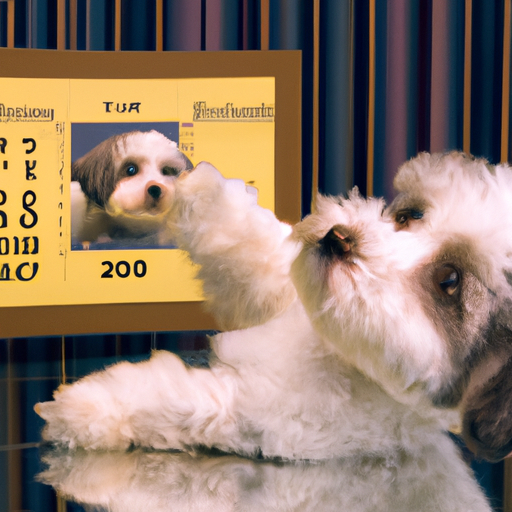Understanding your puppy’s age is crucial in providing the appropriate care, training, and nutrition he needs. It’s not just about knowing how many weeks, months, or years your puppy is. It’s about understanding the different stages of puppyhood and what each stage entails.
Determining Your Puppy’s Age
If you adopted your puppy from a breeder or pet shelter, you probably have a good idea of how old your puppy is. However, if you found your puppy or adopted from an uncertain source, determining the age can be a bit tricky.
Here are some ways to estimate your puppy’s age:
-
Teeth: Puppies get their baby teeth at around 3-4 weeks old. By 8 weeks, all baby teeth should be in. Permanent teeth start coming in around 3-4 months, and by 7 months, most dogs should have all their adult teeth.
-
Size and Breed: Small breed dogs tend to mature faster than large breed dogs. For instance, a 6-month-old Chihuahua might act like an adult, while a Great Dane of the same age is still very much a puppy.
-
Behavior: Puppies are playful, chew a lot, and need to go outside frequently because their bladder is not fully developed. Older dogs are calmer and have better bladder control.
Puppy Development Stages
Understanding the different stages of puppyhood can help you provide the best care and training for your furry friend. Here’s a simple timeline:
| Age | Stage | Key Developmental Aspects |
|---|---|---|
| 0-3 weeks | Neonatal | Mostly eat and sleep |
| 3-12 weeks | Socialization | Learn to interact with other dogs and humans |
| 3-6 months | Juvenile | Rapid growth, teething, and chewing |
| 6-18 months | Adolescence | Sexual maturity, increased independence |
Feeding Your Puppy
The type and amount of food you give your puppy can greatly impact his health and development. Puppies need a diet rich in protein and fat to support their rapid growth.
- 0-3 months: Puppies need to eat four meals a day.
- 4-6 months: You can reduce to three meals a day.
- Over 6 months: Most puppies can be fed twice a day.
Remember to feed your puppy a diet specifically formulated for puppies.
Training Your Puppy
Training should start as soon as you bring your puppy home. Here are some key areas to focus on:
- Socialization: Expose your puppy to different people, animals, and environments.
- Basic commands: Teach simple commands like “sit”, “stay”, and “come”.
- Toilet training: Establish a routine and reward your puppy for doing his business outside.
- Chewing: Provide chew toys to satisfy your puppy’s teething and chewing urges.
Puppy Health Care
Regular vet check-ups and vaccinations are crucial in keeping your puppy healthy. Here are some key health care aspects:
- Vaccinations: Puppies need several rounds of vaccinations in the first year.
- Parasite control: Regular treatments for fleas, ticks, and worms.
- Dental care: Regular teeth brushing can prevent dental diseases.
- Spaying/neutering: It’s generally recommended to spay/neuter your puppy by 6 months of age.
Common Puppy Problems
Puppies can have a variety of problems, from behavior issues to health concerns. Some common ones include:
- Chewing: This is a normal part of puppyhood, but it can be destructive.
- Biting: Puppies often bite in play, but they need to learn bite inhibition.
- Separation anxiety: Puppies can become distressed when left alone.
- Parasites: Puppies are prone to fleas, ticks, and worms.
FAQ’s
Q: When is a puppy considered an adult dog?
A: Generally, dogs are considered adults at one year of age, but this can vary. Small breed dogs may mature faster than large breed dogs.
Q: How often should I take my puppy to the vet?
A: Puppies require several vet visits in the first year for vaccinations and regular check-ups. After that, annual visits are generally sufficient.
Q: How much should I feed my puppy?
A: This depends on your puppy’s age, size, and breed. Always follow the feeding guidelines on the puppy food package.
Q: How can I stop my puppy from biting?
A: Teach your puppy bite inhibition. When he bites, say “ouch” in a firm voice and stop playing. This teaches him that biting leads to negative consequences.
Remember, raising a puppy is a big responsibility, but with knowledge and patience, you can provide a loving and nurturing environment for your furry friend to thrive in.



